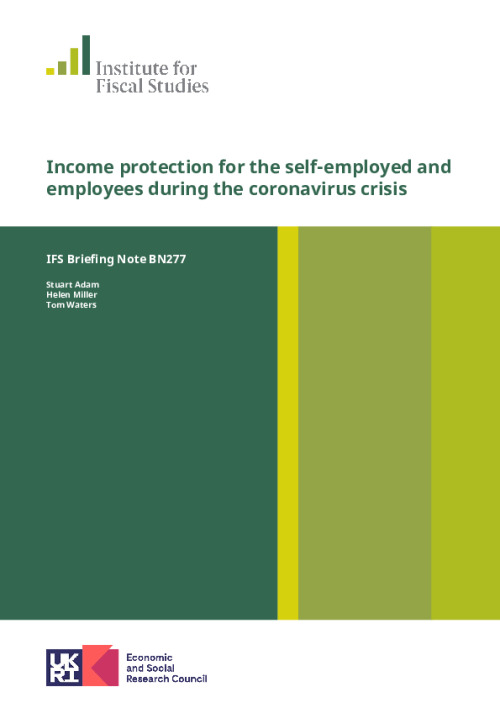The government has announced a series of reforms intended to protect workers against income losses resulting from the coronavirus. First, there have been several temporary benefit giveaways. The basic allowances in universal credit (UC) and working tax credit have both been increased by £1,000 per year. Maximum entitlements to housing benefit (and the housing element of UC) for private tenants have been increased to the 30th percentile of rents in a local area. And the minimum income floor in UC – under which the self-employed are treated as earning the full-time minimum wage if they report earning less – has been suspended. Second, the government is covering 80% of the salary of furloughed employees through the Coronavirus Job Retention Scheme (JRS), up to a cap of £2,500 per month. Third, the government will be giving grants to the self-employed who report that their income has been negatively affected by the coronavirus through the SelfEmployment Income Support Scheme (SEISS). Similar to the JRS, these grants will be up to 80% of self-employed profits, up to a cap of £2,500 per month. Both the JRS and the SEISS are currently due to be in place for three months. Employees are now much better protected from earnings falls resulting from job loss than they were at the start of the coronavirus outbreak. Before the recent reforms, on average, employees would have lost 53% of their net family income if they lost their job. The reforms have reduced this to 13%. The number of employees who would have lost more than 60% of their family income if they lost their job has fallen from 9.5 million (36% of employees) to just 300,000 (1%).
Key findings:
Employees are now much better protected from earnings falls resulting from job loss than they were at the start of the coronavirus outbreak. Before the recent reforms, on average, employees would have lost 53% of their net family income if they lost their job. The reforms have reduced this to 13%. The number of employees who would have lost more than 60% of their family income if they lost their job has fallen from 9.5 million (36% of employees) to just 300,000 (1%).
The self-employed get even more protection, but with a delay in the timing of payments. Very little extra protection is afforded to self-employed workers over the next couple of months: almost half of them would see their family income fall by at least 40% if their work dried up (a figure barely affected by recent increases in universal credit). However, in June most self-employed workers will receive a large grant – up to 80% of three months’ normal profits – if they report being affected by coronavirus at all. If the scheme is extended beyond June, a self-employed person whose business is completely shut down would have a family income thereafter around 14% lower than before the crisis, on average – similar to employees – as opposed to 44% in the absence of recent reforms.
The wait until June for the grant to arrive means it is important to ensure the quick delivery of other mechanisms for the self-employed to access cash in the short term, such as the Coronavirus Business Interruption Loan Scheme and universal credit. A quarter of self-employed people earning less than £50,000 a year do not have enough liquid assets (between themselves and any partner) to cover three months’ lost earnings, and 15% do not have enough to cover a single month.
Many self-employed workers will be better off financially than if the crisis had never happened. If self-employed workers see only a small fall in their profits, half will have a family income more than 20% above their usual level thanks to the grant. Even if their business dries up completely, a quarter will be financially better off while the self-employment grant programme continues than if the coronavirus had never struck.
There are large differences in the types of protection offered to different groups. The Coronavirus Job Retention Scheme provides income replacement for all employees but only where they completely stop working. The Self-Employment Income Support Scheme offers support to just over 80% of those who get the majority of their income from self-employment – not all of them – but provides it regardless of how badly affected their business is. Increases in the generosity of benefits help those with low family incomes and assets, including those out of work. There are people for whom most of their income is not covered by these schemes, including the newly self- employed, self-employed high earners and those who run their business as a company rather than through self-employment.












